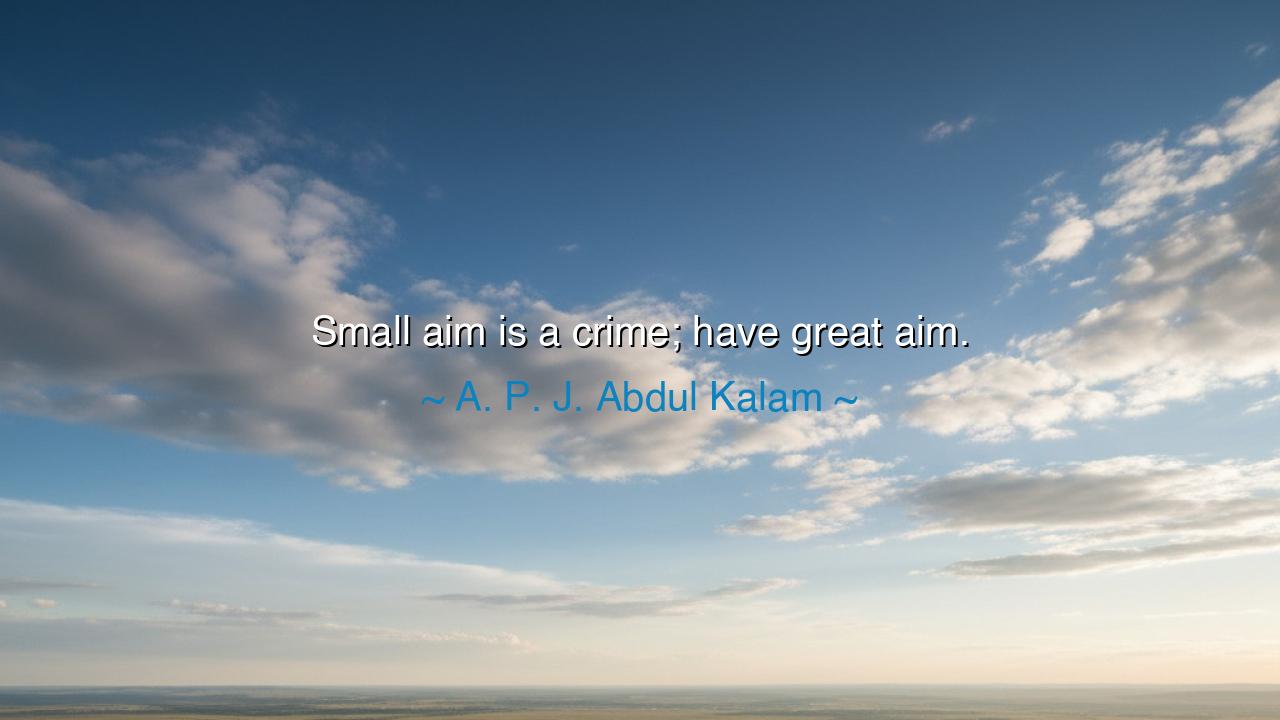
Small aim is a crime; have great aim.






Hearken, O seekers of wisdom, and attend to the words of A. P. J. Abdul Kalam, a sage of science and vision, who proclaimed: “Small aim is a crime; have great aim.” At first glance, these words may appear as counsel on ambition, yet beneath them lies a profound meditation on purpose, courage, and the moral responsibility of the human spirit to aspire beyond mediocrity. The ancients understood that life is too brief and the potential of the soul too vast to squander on timid or trivial goals. To aim low is not merely folly—it is a neglect of the gifts and opportunities entrusted to us.
Kalam begins with the principle of vision as moral obligation. A small aim diminishes the spirit and cheats both self and society of potential greatness. Aristotle taught that the highest human fulfillment arises from the pursuit of excellence in accordance with reason and virtue. To shirk the pursuit of grand goals is to deny the full measure of one’s capacity, turning the human gift of aspiration into negligence. Great aims awaken the soul and honor the potential of human endeavor.
The essence of this wisdom lies in courageous aspiration. To aim high is to embrace risk, uncertainty, and effort far beyond comfort. Consider the young Apollo 11 astronauts, who dared to reach beyond their earthly confines to touch the heavens. Their aim was vast, the stakes monumental, and yet their courage transformed the possible into the extraordinary. Kalam reminds us that life demands not mere participation, but the audacity to dream boldly and pursue relentlessly.
Kalam’s reflection also illuminates the power of ambition to inspire and transform. Great aim not only shapes the individual but galvanizes those around them, creating ripples of innovation, courage, and hope. The Renaissance artists and scientists—Michelangelo, Galileo, and da Vinci—did not settle for modest accomplishments; their vision reshaped the world. The audacity to aim high is itself a catalyst for progress, stirring minds and hearts to rise to the occasion.
The quote further underscores the moral dimension of aspiration. A small aim may protect comfort, yet it betrays the gifts, effort, and responsibilities inherent in the human condition. Leaders, thinkers, and innovators throughout history recognized that to aim low is to dishonor life itself. Abraham Lincoln, confronting a nation divided and on the brink of war, did not pursue minor reforms but sought the monumental goal of preserving the Union and abolishing slavery. His example illustrates Kalam’s truth: great aim is inseparable from ethical courage and vision.
From this reflection emerges a practical teaching: define aims that stretch your abilities and challenge your courage. Do not shrink from lofty objectives for fear of failure, for the cost of timidity is far greater than that of risk. Cultivate clarity of purpose, align your effort with your highest ideals, and pursue goals that elevate both self and society.
Practically, this calls for disciplined focus and deliberate action: set goals that inspire passion and determination, break them into achievable steps, and persist despite obstacles. Surround yourself with mentors, allies, and resources that reinforce bold ambition, and allow setbacks to serve as lessons rather than deterrents. In this way, ambition becomes both a moral compass and a vehicle for achievement.
Thus, let it be known: to aim small is a crime against the potential of the human spirit; to aim great is to honor life, courage, and purpose. Walk through life with audacity, clarity, and vision, daring to reach beyond the ordinary and to transform aspiration into achievement. In this practice, greatness is not only pursued but realized, and the legacy of human endeavor is enriched for generations yet unborn.






AAdministratorAdministrator
Welcome, honored guests. Please leave a comment, we will respond soon